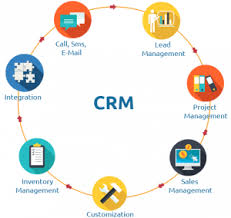The Power of Cloud CRM Software
In today’s digital age, businesses are constantly seeking ways to streamline their operations and enhance customer relationships. One powerful tool that has revolutionized the way companies manage their customer interactions is Cloud CRM software.
Cloud CRM (Customer Relationship Management) software offers a range of benefits for businesses of all sizes. By leveraging cloud technology, businesses can access their CRM system from anywhere with an internet connection, making it convenient for remote teams and on-the-go professionals.
One key advantage of cloud CRM software is its scalability. Businesses can easily scale their CRM system as their operations grow, without the need for expensive hardware upgrades or IT maintenance. This flexibility allows companies to adapt to changing business needs and market demands quickly.
Cloud CRM software also provides real-time data insights, allowing businesses to make informed decisions based on up-to-date information about customer interactions, sales performance, and marketing campaigns. This data-driven approach enables companies to tailor their strategies to meet the unique needs of individual customers and improve overall business performance.
Security is a top priority for businesses when it comes to managing customer data. Cloud CRM software offers robust security features, including data encryption, user authentication controls, and regular backups to protect sensitive information from cyber threats and data breaches.
Furthermore, cloud CRM software integrates seamlessly with other business applications, such as email marketing platforms, e-commerce systems, and social media channels. This integration streamlines workflows and enhances productivity by centralizing all customer-related activities in one place.
In conclusion, cloud CRM software is a powerful tool that empowers businesses to build stronger customer relationships, improve operational efficiency, and drive growth. By harnessing the capabilities of cloud technology, companies can stay ahead of the competition and deliver exceptional experiences that keep customers coming back for more.
Understanding Cloud CRM Software: Key Questions Answered
- What is a cloud CRM Salesforce?
- What is a CRM cloud technology?
- What are the 3 types of CRM?
- Which is the most commonly used CRM software?
What is a cloud CRM Salesforce?
A cloud CRM Salesforce refers to a Customer Relationship Management (CRM) software provided by Salesforce, a leading cloud-based software company. Salesforce offers a comprehensive CRM solution that is hosted in the cloud, allowing businesses to access their customer data and manage relationships from anywhere with an internet connection. Cloud CRM Salesforce provides a range of features and functionalities, including sales automation, marketing automation, customer service management, analytics, and more. With Salesforce’s cloud CRM solution, businesses can streamline their operations, improve customer interactions, and drive growth by leveraging the power of cloud technology.
What is a CRM cloud technology?
CRM cloud technology refers to Customer Relationship Management software that is hosted and accessed through cloud computing services. In simple terms, it means that the CRM system is not installed on a local server but is instead delivered over the internet. This allows businesses to store customer data, manage interactions, and track sales activities in a virtual environment that can be accessed from any device with an internet connection. CRM cloud technology offers scalability, flexibility, real-time data insights, enhanced security measures, and seamless integration with other business applications. By leveraging the power of cloud computing, businesses can streamline their operations, improve customer relationships, and drive growth effectively.
What are the 3 types of CRM?
When it comes to Customer Relationship Management (CRM) software, there are three main types that businesses commonly use: operational CRM, analytical CRM, and collaborative CRM. Operational CRM focuses on automating and improving customer-facing processes such as sales, marketing, and customer service. Analytical CRM involves analysing customer data to gain insights into customer behaviour and preferences, enabling businesses to make data-driven decisions. Collaborative CRM emphasises communication and interaction with customers across various touchpoints to enhance relationships and foster customer loyalty. Each type of CRM serves a specific purpose in helping businesses effectively manage their customer relationships and drive business growth.
Which is the most commonly used CRM software?
When it comes to the question of which CRM software is the most commonly used, one name that consistently stands out is Salesforce. Salesforce is a widely popular CRM platform known for its robust features, scalability, and versatility. It is trusted by businesses of all sizes across various industries for its ability to streamline customer relationships, improve sales processes, and enhance overall business performance. With a user-friendly interface and a wide range of customization options, Salesforce has become a go-to choice for many organisations seeking a comprehensive CRM solution that meets their specific needs.

